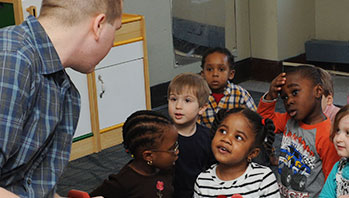- recordings from the week
- music
- pitch
- pluck
- sound
MA Standards:
Speaking and Listening: SL.PK.MA.1 Participate in collaborative conversations with diverse partners during daily routines and play.
Language: L.PK.MA.1 Demonstrate use of oral language in informal everyday activities.
Language: L.PK.MA.6 Use words and phrases acquired through conversations, listening to books read aloud, activities, and play.
Head Start Outcomes:
Language Development/Receptive Language Attends to language during conversations, songs, stories, or other learning experiences.
Language Development/Expressive Language Uses language to express ideas and needs.
PreK Learning Guidelines:
English Language Arts/Language 2 Participate actively in discussions, listen to the ideas of others, and ask and answer relevant questions.
Talk Together: Repeating Sounds

© Commonwealth of Massachusetts, Department of Early Education and Care (Jennifer Waddell photographer). All rights reserved.
STEM Key Concepts: Different objects make different sounds; Sounds vary in three ways: volume (loud or soft), pitch (high or low), and timbre (quality); A sound becomes louder when the force of the action that is creating the sound is increased (for example, when you hit a drum harder); A sound becomes softer, or quieter, when the force is decreased
ELA Focus Skills: Listening and Speaking, Vocabulary
Replay recordings and discuss sounds children made this week. Use key words to ask questions such as,
- How do you think Sophie made that high pitch sound?
- Can you describe the sounds you made when you were plucking the rubber bands? Encourage children to repeat the sounds as they discuss.
Tell children they are going to continue to explore making sounds by playing rubber band music.
